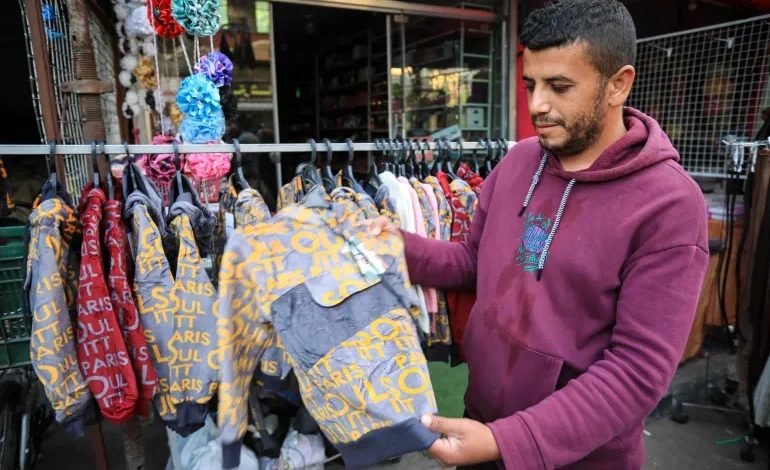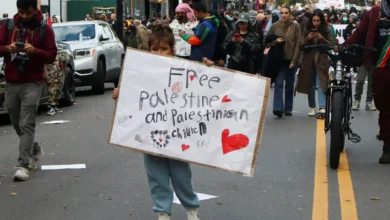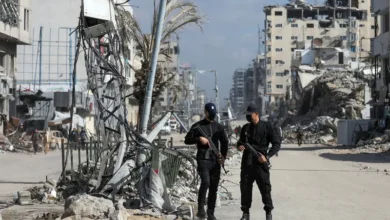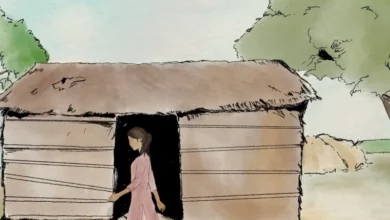‘We’re not here to beg’: Gaza residents’ anger over steep rise in prices

As the sounds of war quietened with the advent of the first truce between Israel and Hamas since October 7, the markets in the Gaza Strip have been flooded with shoppers, desperate to buy food supplies and winter clothes.
But the cost of these products has skyrocketed, particularly for basic foodstuffs, sparking anger and resentment among shoppers who blame shopkeepers and stallholders for high prices.
Imm Abdullah, who was displaced from her home in the Nassr neighbourhood in Gaza City a month ago after Israel ordered people in northern Gaza to move south, has been staying at one of the United Nations-run schools in Deir el-Balah with her 12 children and grandchildren. She said conditions in the school have become desperate, with no water and barely any provisions.
“When the Israelis threw leaflets down at us, I left with my family wearing just my prayer clothes,” she said. “At the school, we barely get food assistance. The other day we got a can of tuna. How am I supposed to sustain my family with that?”
Imm Abdullah had come to the town’s market to try to buy food and some warmer clothes for herself and her grandchildren, as the weather had turned cold. But after visiting different stalls to look for basic food products, her exasperation bubbled over.
“I don’t believe the merchants when they say the prices are out of their control,” she said. “They can regulate prices and be considerate of the fact that we are going through exceptional times, which is not something they should take advantage of.”
She rattled off a list of products that are now unaffordable: Bottled water, which used to be 2 shekels ($0.50), is now 4 or 5 shekels ($0.80-$1). A carton of eggs is 45 shekels ($12). A kilo of salt, which used to be 1 shekel is now 12 ($3.20), while sugar is 25 shekels ($6.70).
“It’s so unfair,” Imm Abdullah said. “I can’t take it any more and some days I go sit by the sea and weep because I don’t know how to feed or sustain my family. Sometimes I wish we had stayed in our home and got bombed instead of going through this.”
Billions lost due to blockade
According to the Palestinian Central Bureau of Statistics, the poverty rate in the Gaza Strip has reached 53 percent, with one-third (33.7 percent) of Gaza residents living in extreme poverty.
Approximately 64 percent of households in Gaza are without enough food, and unemployment is at 47 percent – one of the highest rates in the world.
According to Elhasan Bakr, an economic analyst based in Gaza, the price distortion has led to inflation of between 300 and 2,000 percent for various products.
Even before October 7, a 17-year Israeli blockade on the coastal enclave had resulted in the loss of $35bn to the Palestinian economy.
“The latest Israeli aggression has been another nail in the coffin of Gaza’s economy,” Bakr told Al Jazeera. “The direct loss to the private sector has surpassed $3bn, while the indirect losses are more than $1.5bn.”
“From October 22 to November 12 – in those 20 days – fewer than 1,100 trucks entered the Gaza Strip,” Bakr said. “Fewer than 400 of these trucks carried food products. Barely 10 percent of Gaza’s food sector needs are met. This is nowhere near enough, especially when you consider the fact that, before October 7, at least 500 trucks used to enter the Strip on a daily basis.”
The Gaza Strip, he added, would need 1,000 to 1,500 trucks a day to deliver the needs of the population of 2.3 million.
‘We had to walk past dead bodies to shop’
In the Deir el-Balah market, Mohammed Yasser Abu Amra stands over the bags of spices and grains that he sells each day that the truce lasts.
“The war has affected everything, from delivery costs to supplies,” the 28-year-old said. “Whatever I have now, once that is finished I won’t have the money to buy the same products because it’ll be more expensive, so that leaves me no choice but to raise prices to break even.”
The main reason for the price rises, he said, is the closure of the border crossings, which has led to wholesale merchants selling products to shopkeepers at much higher prices.
“Lentils used to be 2 shekels ($0.50) per kilo and we would sell it for 3 ($0.80),” Abu Amra said. “Now we buy it for 8 shekels ($2) and sell it for 10 ($2.60).”
A bag of fava beans used to be 70 shekels ($18) and is now priced at 150 shekels ($40), he added, while previously a bag of cornflour would be 90 shekels ($19) but is now 120 shekels ($32). Abu Amra’s neighbour, also a shopkeeper, lost his home and warehouse in an Israeli attack, resulting in the loss of $8,000 worth of produce.
Another shopper, Imm Watan Muheisan, said loudly – to the chagrin of nearby shopkeepers – that the current prices are “insane”.
“If you have 1,000 shekels ($270), you can only buy a handful of food items,” she snapped. “One kilo of potatoes is now 25 shekels ($6.70), it used to be three kilos for 5 shekels ($1.70).”
The mother of seven, who fled her home in the Shati (Beach) refugee camp east of Gaza City four weeks ago, is sheltering at the Deir el-Balah UN school for girls where, she said, she and her family are barely surviving.
“We walked here and had to pass by the dead bodies on the street,” she said. “We used to wear our best clothes to market… we’re not here to beg.”










